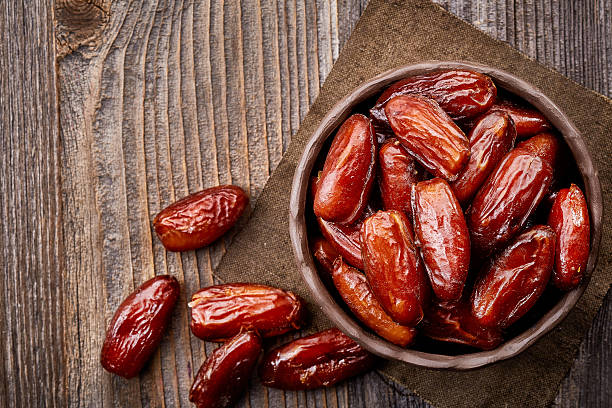The date fruit, often referred to as the "fruit of the desert," is a small, oblong fruit that grows on the date palm tree (Phoenix dactylifera), primarily in the Middle East and North Africa. With a rich, caramel-like flavor and a chewy texture, dates are known for their natural sweetness and are considered a powerhouse of nutrition.
Appearance and Taste
Dates are typically dark brown, ranging from deep amber to almost black when fully ripe. They have a smooth, glossy skin and a pit (or seed) at the center. The flesh is soft, dense, and sticky, with a sweetness that makes them a popular natural sweetener in various cuisines. Depending on the variety, dates can be small and narrow or large and plump.
Nutritional Profile
Dates are an excellent source of energy, making them a popular snack for athletes and anyone in need of a quick energy boost. Packed with essential vitamins and minerals, they are:
- High in Fiber: Dates are rich in soluble fiber, which supports digestive health and helps regulate blood sugar levels.
- Loaded with Natural Sugars: Dates provide natural sugars like glucose, fructose, and sucrose, which are easily absorbed by the body for a quick energy release.
- Rich in Vitamins and Minerals: Dates contain significant amounts of potassium, magnesium, copper, and Vitamin B6. These nutrients are vital for heart health, muscle function, and overall vitality.
- Antioxidant-Rich: Dates are packed with antioxidants, including flavonoids, carotenoids, and phenolic acid, which help protect the body from oxidative stress and inflammation.
Varieties of Dates
There are many different types of dates, each with its unique characteristics. Some of the most popular varieties include:
- Medjool Dates: Known for their large size, soft texture, and rich flavor, Medjool dates are often called the "king of dates." They are naturally sweet and are commonly enjoyed as a snack or in desserts.
- Deglet Noor: Slightly smaller than Medjool dates, Deglet Noor dates are firmer and less sweet but still have a pleasant, mild flavor. They are often used in cooking and baking.
- Barhi Dates: These dates are softer, sweeter, and more delicate, with a flavor reminiscent of brown sugar and honey.
Health Benefits
In addition to their sweet taste, dates offer a range of health benefits:
- Energy Boost: Dates are rich in natural sugars, providing a quick energy source for the body. They're perfect as a pre- or post-workout snack.
- Digestive Health: The fiber in dates helps to improve digestion and promote regular bowel movements, preventing constipation.
- Heart Health: The potassium and magnesium in dates help regulate blood pressure and maintain healthy heart function.
- Rich in Iron: Dates contain iron, which is crucial for the production of red blood cells and can help prevent anemia.
- Bone Health: Dates provide minerals like calcium and phosphorus, which contribute to stronger bones and teeth.
Culinary Uses
Dates are versatile and can be enjoyed in many ways. They can be eaten on their own as a sweet snack, paired with nuts and cheese for a healthy appetizer, or used in a variety of dishes, such as:
- Smoothies: Blend dates with yogurt, milk, or fruit for a natural sweetener and extra fiber.
- Baked Goods: Dates can be chopped and added to cakes, muffins, and cookies for natural sweetness and texture.
- Stuffed Dates: Dates can be stuffed with nuts, cheese, or even bacon for a delicious, savory treat.
- Date Syrup: A popular alternative to honey or maple syrup, date syrup can be drizzled on pancakes, yogurt, or oatmeal.
Conclusion
Date fruit is not only a delicious and naturally sweet treat but also a nutrient-dense superfood packed with fiber, vitamins, and minerals. Whether eaten on their own, used in cooking, or added to desserts, dates are a versatile fruit that offers numerous health benefits. Rich in history and widely beloved for their flavor, dates are an essential ingredient in many cultures and cuisines around the world.

Comments
Post a Comment